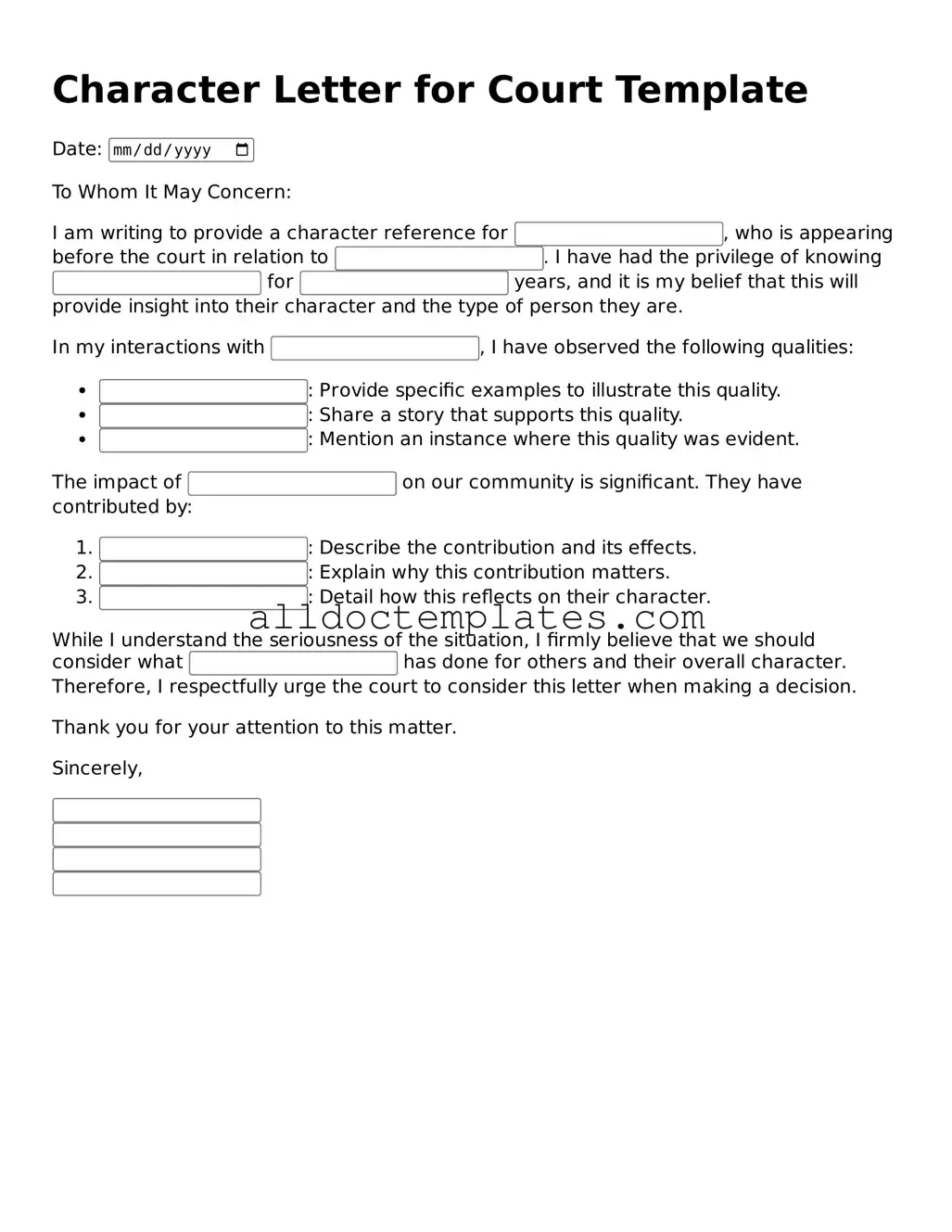Valid Character Letter for Court Template
Document Sample
Character Letter for Court Template
Date:
To Whom It May Concern:
I am writing to provide a character reference for , who is appearing before the court in relation to . I have had the privilege of knowing for years, and it is my belief that this will provide insight into their character and the type of person they are.
In my interactions with , I have observed the following qualities:
- : Provide specific examples to illustrate this quality.
- : Share a story that supports this quality.
- : Mention an instance where this quality was evident.
The impact of on our community is significant. They have contributed by:
- : Describe the contribution and its effects.
- : Explain why this contribution matters.
- : Detail how this reflects on their character.
While I understand the seriousness of the situation, I firmly believe that we should consider what has done for others and their overall character. Therefore, I respectfully urge the court to consider this letter when making a decision.
Thank you for your attention to this matter.
Sincerely,
Form Data
| Fact Name | Description |
|---|---|
| Purpose | A Character Letter for Court supports a defendant by providing insight into their character and behavior. |
| Format | The letter is typically formatted as a formal letter, including the writer's contact information, date, and salutation. |
| Content | It should include specific examples of the individual's positive traits, behaviors, and contributions to the community. |
| Length | A character letter is usually one to two pages long, concise yet thorough in its praise. |
| Signature | The writer must sign the letter, adding a personal touch and authenticity. |
| State-Specific Forms | Some states may have specific requirements or formats for character letters, influenced by local court rules. |
| Governing Laws | In California, for example, character letters are governed by the California Evidence Code Section 1101. |
| Submission | These letters are typically submitted to the court before sentencing or during a hearing. |
| Impact | A well-written character letter can positively influence a judge's decision regarding sentencing. |
| Confidentiality | Writers should be aware that character letters may become part of the public court record. |
Character Letter for Court - Usage Guidelines
Filling out the Character Letter for Court form is an important step in providing the court with personal insights about an individual. Follow the steps below to complete the form accurately.
- Begin with your name and address at the top of the letter. Ensure this information is current and clearly stated.
- Include the date when you are writing the letter. This helps the court understand the timeline of your relationship with the individual.
- Address the letter to the appropriate court or judge. Use "Dear Honorable Judge [Last Name]" if you know the judge's name.
- Introduce yourself. State your name, your relationship to the individual, and how long you have known them.
- Provide specific examples of the individual's character. Highlight positive traits and behaviors that demonstrate their good character.
- Discuss any relevant experiences you have shared with the individual that support your positive assessment.
- Keep the tone respectful and sincere throughout the letter. Avoid exaggeration and focus on honest observations.
- Conclude the letter by expressing your willingness to provide further information if needed. Offer your contact information for follow-up.
- Sign the letter at the bottom. Include your printed name beneath your signature.
More Types of Character Letter for Court Templates:
How to Write a Letter of Recommendation for a Coworker - They actively contribute to a positive workplace culture through their actions and attitudes.
When seeking endorsements for a candidate, using a well-structured Recommendation Letter form can greatly improve the chances of success. For those looking to create or customize such documents, resources like PDF Templates Online offer valuable templates that streamline the process, ensuring that all important aspects are covered to present a compelling endorsement.
How to Write a Letter of Recommendation for Eagle Scout - The recommendation emphasizes the scout's sense of duty and willingness to help others in need.
Nursing Reference Example - Highlight any special skills or certifications relevant to the nursing field.
Dos and Don'ts
When preparing a Character Letter for Court, it is important to approach the task thoughtfully. Below is a list of things to consider doing and avoiding during this process.
- Do clearly state your relationship to the person in question.
- Do provide specific examples of the individual’s character and behavior.
- Do maintain a respectful and formal tone throughout the letter.
- Do keep the letter concise and focused on relevant information.
- Do proofread for spelling and grammatical errors before submission.
- Don't include irrelevant personal anecdotes or unrelated information.
- Don't use overly emotional language or make exaggerated claims.
- Don't write in a way that could be perceived as biased or prejudiced.
- Don't forget to sign and date the letter before submission.
Common mistakes
-
Not being specific enough. When filling out the Character Letter for Court form, people often write vague statements about the individual’s character. Instead of general praise, it’s important to provide specific examples of positive behavior or incidents that demonstrate the person's character traits.
-
Using overly formal language. Many individuals try to sound professional by using complicated words or legal jargon. However, this can make the letter difficult to read. A straightforward and sincere tone is usually more effective.
-
Failing to include personal anecdotes. Letters that lack personal stories can feel impersonal. Including a brief story or experience can help illustrate the individual’s character in a relatable way.
-
Neglecting to proofread. Spelling and grammatical errors can undermine the credibility of the letter. Taking the time to review the letter for mistakes can make a significant difference in how it is received.
